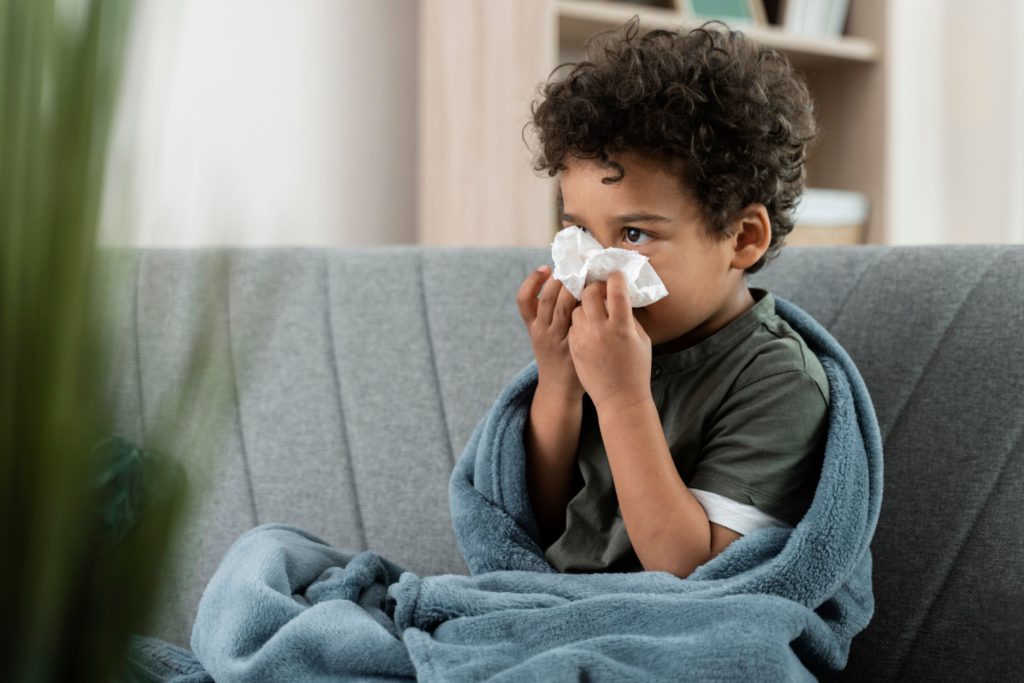When your baby gets a cold, it can be a major source of discomfort for them, and for you. This is because when a baby has too much mucus, it can clog up the airway and make it hard to eat or breathe.

This article will tell you all about how best to identify, relieve, manage, and prevent stuffy noses at home. We will also talk about when it’s time to take your baby to see a doctor.
Symptoms of A Stuffy Nose
Some of the symptoms of a stuffy nose in babies may include:
- A blocked or runny nose
- Noisy or more noticeable breathing
- Coughing
- Snoring when asleep or sleeplessness
- Difficulty when feeding or reduced appetite
- Irritability or fussiness
- Sniffling
- Sneezing
Now that we know what a stuffy nose looks like, here’s how you can relieve it.
The First Step
The first step in relieving your baby’s stuffy nose is to identify triggers. Stuffy noses are not caused by just one thing.
In fact, there are a variety of things that could trigger a runny nose. Some of these things are:
- Infections, such as a cold
- Changes in weather
- Breathing in dry air
- Breathing in air pollutants
- Allergies
Home Remedies to Relieve A Stuffy Nose
It’s good to note that not every stuffy nose needs the attention of a doctor. Runny noses are actually a good thing for babies because it’s their bodies’ way of getting rid of germs. So sometimes, you may just need to wait it out. However, there are home remedies that could help relieve your baby’s stuffy nose.
Saline Drops and Suction Bulb
Saline or salt water spray or nose drops are one of the most effective and safest ways to help clear a stuffy nose. You can buy these products from the store without a prescription.
Increase the Humidity
Adding moisture to the air can keep mucus from drying up inside your baby’s nose. You can do this by using a humidifier to release cool mist into the room, or running a warm bathroom with your baby while he or she breathes in the warm, moist air.
Cleaning the Nose
This is important because mucus can sometimes harden around a baby’s nose and become crusty or sticky, possibly blocking the nostrils. Wet a cotton swab with warm water and gently wipe the area to clean it carefully.

Some other things you can try include:
- Applying skin-protective cream around the nostrils to prevent breakdown or chapping. You should use only a very thin layer, and it should only be placed around the nose and NOT inside of it.
- Massaging their cheekbones, forehead, temples, and nasal bridge gently.
- Giving your baby enough fluids to replenish what is lost through mucus.
When to Call Your Doctor
If your baby is eating well, showing no symptoms of fever or cough, and acting normally other than having a blocked nose, then just leave them be and simply keep a close eye on them.
You should call the doctor if things don’t get better after a couple of days, your child starts to heat up with a fever, develops a cough loses his appetite, and starts to vomit.
Also, be on the lookout for the following signs:
- Grunting or moaning at the end of each breath
- A panicked look
- Flaring nostrils
- Breathing too hard or fast to be able to feed
- Ribs pulling in on each breath.
If your baby is experiencing any of these, get them to the nearest hospital as soon as possible. They are signs that your baby is having difficulty breathing and may require emergency care.
How to Prevent A Stuffy Nose
The best way to prevent a stuffy nose is to identify the possible causes of your infant’s stuffy nose. Then, you can create a better environment or better prepare them and perhaps even prevent a stuffy nose next time.
Here are some additional tips to help prevent a stuffy nose:
- Wash your hands whenever you touch your child to avoid spreading germs. Additionally, wash their hands as well.
- Make sure that they are properly clothed in preparation for any weather changes.
- Do not expose your baby to irritants like dust, cigarette smoke, or perfume.
- Consider taking them to a doctor to find out if they have any allergies, and if your baby does have allergies that you are aware of, make sure that their environment is free and comfortable for them to sleep and play in.
- Ensure that the air around them is moist as often as possible as breathing in dry air could cause stuffy noses.
- Ensure your baby is appropriately treated if ever their stuffy noses become severe.
These tips will create a better environment for you and your baby and might help in preventing a stuffy nose next time.

